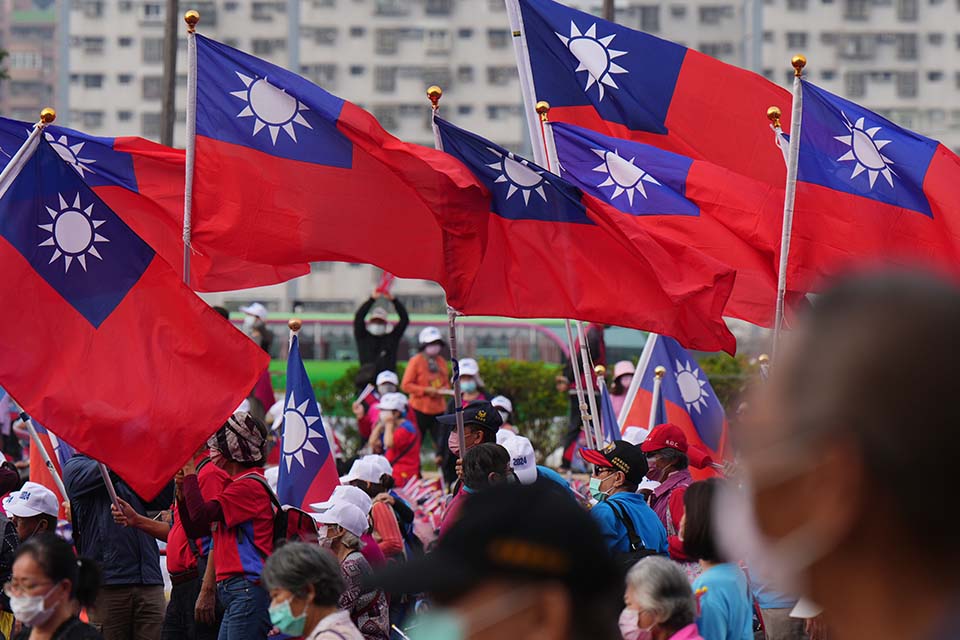2024 Elections: Taiwan Faces Chinese Disinformation and Potential Domestic Unrest

By Hamsini Hariharan
The Taiwanese presidential elections are scheduled to take place on 13 January 2024. The three main contenders are the Democratic Progressive Party (DPP) led by William Lai Ching-te, Taiwan People’s Party (TPP) led by Kou Wen-je, and Kuomintang (KMT) led by Hou Yu-ih. The DPP, which has already been in power for two terms, faces an anti-incumbency sentiment, but continues to appeal to pro-independence voters based on its platform of Taiwanese autonomy, diversification away from the Chinese economy, and progressive policies.
On the other hand, the KMT and the TPP are seen as more friendly towards China, and the two parties briefly announced a joint partnership which split in early November. The KMT advocates for increasing cross-strait dialogue, upholding the 1992 consensus and defensive deterrence. The TPP has focused on a domestic agenda about the economy, housing and energy security rather than a set position on relations with the mainland.
According to the polls, the DPP is projected to win the vote, however not gain as much of a majority as it did in the 2020 elections.
The main issues for Taiwanese voters include the threat of a Chinese invasion, the economy, energy security and military conscription.
Potential for foreign influence
The People’s Republic of China under the Chinese Communist Party (CCP) has attempted to and will continue its efforts to influence the Taiwanese elections. The CCP has utilized several different tactics including the intimidation of officials, threatening the use of military force, low-level escalation, and spreading disinformation. In August 2023, Terry Gou, the former founder of Foxconn with ties to the KMT announced that he would run as an independent candidate. In October, the CCP began a tax audit of Foxconn’s offices across the mainland, possibly to indicate the Chinese government’s displeasure at Gou’s presidential bid, as he would further splinter the opposition vote. Eventually Gou dropped out of the election, after attempting to bring the KMT and TPP together for a joint opposition bid.
The Taiwanese government is also concerned about the threat of Chinese espionage. In August 2023, two Taiwanese business people were arrested for recruiting soldiers to collect confidential information regarding Taiwanese military exercises. In November 2023, the Taiwanese government arrested ten active and retired soldiers for stealing state secrets, pledging allegiance to the CCP and treason. In December, a Taiwanese pilot was arrested for allegedly planning to defect to China for USD $ 15 million. These instances highlight a concerted effort from the CCP to collect information about the Taiwanese military.
The CCP also particularly targets the DPP, which is seen as a pro-independence party. Common narratives include claims that Vice President candidate Hsaio Bi-khim is a US citizen, that the DPP in government has ‘wiretapped’ thousands of Taiwanese people, that the CIA has handpicked DPP politicians and funds their activities, and that there is widespread corruption in the party.
Disinformation by the Chinese state continues to proliferate in the run up to the elections. One of the tactics that the CCP utilizes is amplifying Taiwanese anxieties about the US. Examples of disinformation with possible Chinese origins in 2023 include:
- Claims that the US would destroy Taiwan Semiconductor Manufacturing Company (TSMC) in case of conflict
- Claims that America had asked Taiwan to engage in biological weapon development
- Claims that the US would stockpile munitions in Taiwan to target China despite the hazards it would pose to the Taiwanese
The potential for foreign interference, manipulation and interference to shape the Taiwanese elections remains extremely high.
Potential for Domestic Unrest
The Taiwanese government and social media have taken a number of steps to counter the threat of Chinese disinformation. These include the launch of AI chatbots, crowdsourced fact-checks, government investment to tackle disinformation, and media literacy campaigns. However, as Chinese disinformation becomes increasingly sophisticated through the use of generative AI and other technologies, the narratives widen societal fault lines within Taiwan.
While military analysts argue that the People’s Liberation Army will only gain the military capability to invade the island by 2027, the upcoming elections remain extremely contentious, leading to a moderate potential for domestic unrest.
References
- scmp.com/news/china/politics/article/3242634/taiwan-opposition-parties-fail-agree-joint-presidential-candidate-boost-ruling-democratic
- cfr.org/blog/taiwans-2024-presidential-election-analyzing-hou-yu-ihs-foreign-policy-positions
- foreignpolicy.com/2024/01/02/taiwan-elections-president-dpp-kmt-china/
- bloomberg.com/news/articles/2024-01-02/last-taiwan-polls-show-us-friendly-dpp-set-for-election-victory
- usip.org/publications/2023/11/what-you-need-know-about-taiwans-pivotal-presidential-elections
- asia.nikkei.com/Politics/Taiwan-elections/Foxconn-s-Gou-caught-up-in-U.S.-China-tug-of-war-over-Taiwan-election
- channelnewsasia.com/asia/taiwan-father-son-two-soldiers-charged-over-china-spying-espionage-3684876
- taipeitimes.com/News/front/archives/2023/11/28/2003809813
- taipeitimes.com/News/front/archives/2023/12/12/2003810498
- nytimes.com/2023/11/26/business/media/taiwan-china-disinformation.html
- media.defense.gov/2023/Apr/24/2003205865/-1/-1/1/07-AMONSON%20&%20EGLI_FEATURE%20IWD.PDF
